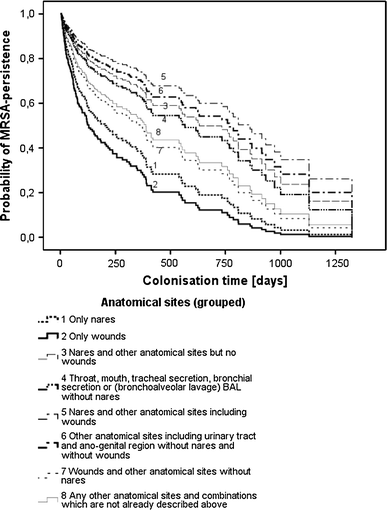Long-term persistence of MRSA in re-admitted patients
- PMID: 20602144
- PMCID: PMC2945710
- DOI: 10.1007/s15010-010-0038-8
Long-term persistence of MRSA in re-admitted patients
Abstract
Background: A better knowledge of methicillin-resistant Staphylococcus aureus (MRSA) persistence in hospitalised patients may impact on specific prevention strategies. We have investigated the persistence of MRSA-carriage in patients admitted and re-admitted to a university hospital.
Patients and methods: Between January 2002 and October 2005 all MRSA-positive patients admitted to the university hospital of Hannover Medical School were assessed at first admission and all subsequent re-admissions. Patients re-admitted at least once were analysed for the persistence or loss of MRSA. The association of possible factors influencing the persistence of MRSA colonisation or infection (age group, gender, decolonisation therapy during first hospital stay due to MRSA positivity and colonisation of different anatomical sites) was analysed using univariate, multivariate and time-dependent analyses.
Results: A total of 1,032 patients who had tested positive at least once for MRSA were admitted to our hospital during the study period, accounting for 2,038 admissions. Of these patients, 403 (39.1%) were admitted more than once (from two times to 21 times), and 238 (59.1%) of the re-admitted patients remained MRSA positive during all subsequent admissions. Fifty-five (13.6%) patients tested MRSA negative at their last admission, and 61 (15.1%) tested MRSA negative at at least two consecutive admissions. In 27 (6.7%) patients, the MRSA status differed more than once between subsequent admissions. Overall, the half-life time (HLT) of MRSA persistence was 549 days, with the duration of persistence dependent on the colonisation of different anatomical sites (HLT only wounds 117 days; HLT mouth, throat, bronchial secretions 627 days; HLT nose, wounds and other body sites 801 days; p < 0.01) and was prolonged if more than one body site was MRSA-positive (HR 2.18, 95% confidence interval 1.52-3.15).
Conclusion: A detailed knowledge of the dynamics of the loss of MRSA infection could result in a reduction of the incidence of MRSA in the future. Multiple anatomical site carriage of MRSA appeared to predict a prolonged persistence in our cohort of patients re-admitted to a university hospital.
Figures


References
-
- Witte W, Kresken M, Braulke C, Cuny C. Increasing incidence and widespread dissemination of methicillin-resistant Staphylococcus aureus (MRSA) in hospitals in central Europe, with special reference to German hospitals. Clin Microbiol Infect. 1997;3:414–422. doi: 10.1111/j.1469-0691.1997.tb00277.x. - DOI - PubMed
MeSH terms
LinkOut - more resources
Full Text Sources
Medical

